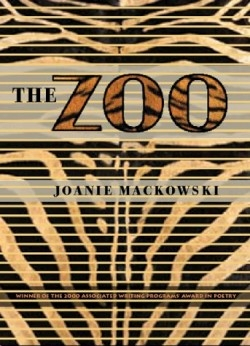The Zoo
“Clustered on the bay, fifty
pelicans / rise, fly circles, dive-each angular / as origami, newspaper-colored-/ and demonstrate the lazy elegance / of predation.“ This combination of metaphysical thought and exacting images, with its lucidity and palimpsestic qualities, is typical of the poems in this volume. The poet’s unrelenting pursuit of the perfect phrase—“a speedboat pulls open a long wake like a zipper,” “cars outside flick their headlights on to know the world they narrow”—illustrates a true mastery of craft and of patience. Nothing is slipshod or wasted; the book moves slowly, as if underwater, with that kind of deliberation and grace.
Winner of the 2000 Associated Writing Programs’ Award in Poetry, The Zoo reads like a forgotten volume by Elizabeth Bishop. Like Bishop’s work, many of these poems revolve around settings. In “By Tomales Bay,” Mackowski writes: “A thick curtain of fog / just now lifts partway, lending the narrow / bay a look of surprise, a limbo / look between certainty and doubt,” and so moves the poem from the certainty of craft and creation to the uncertainty of our place in the world. Her poems celebrate those places seemingly most insignificant: the ant’s terrain, the Zen-like hold of a ferry. Place, and the act of truly occupying it through study and self-awareness, becomes one more way in which the poet can enact experience.
Her specificity is broad and eclectic; she may choose to consider hats or islands, zoo animals, bugs, or birds. For her, knowledge exists, as beauty exists, in everything; her strength lies in recovering forgotten knowledge. What seemed to be the mechanics of life cease to be machinations; they become conscious acts of choice and recognition, acts of recovery. When Mackowski claims, “I lay in a big bed so empty it hovered,” it seems inevitable that so careful a thinker and poet will communicate her loneliness to her bed. Her respect for “No ideas but in things,” for the central spirit of a thing, pervades the book.
Mackowski, currently a creative writing fellow at University of Missouri-Columbia, combines her intense observations with a strange wit. She wryly recounts gravestone epithets: “In memory of Margaret, who should / have been the wife of Mr. Simeon / Palmer, dead in her 64th year—She’s buried adjacent / to Lydia, Mr. Palmer’s late wife. / Death’s editing is rigorous with life.” Often, that humor disarms, making way for nettling observations to settle into the skin. That is Mackowski’s way-subtle, sure, and insidious, the best of all predators, she consumes her readers.
Disclosure: This article is not an endorsement, but a review. The publisher of this book provided free copies of the book to have their book reviewed by a professional reviewer. No fee was paid by the publisher for this review. Foreword Reviews only recommends books that we love. Foreword Magazine, Inc. is disclosing this in accordance with the Federal Trade Commission’s 16 CFR, Part 255.

